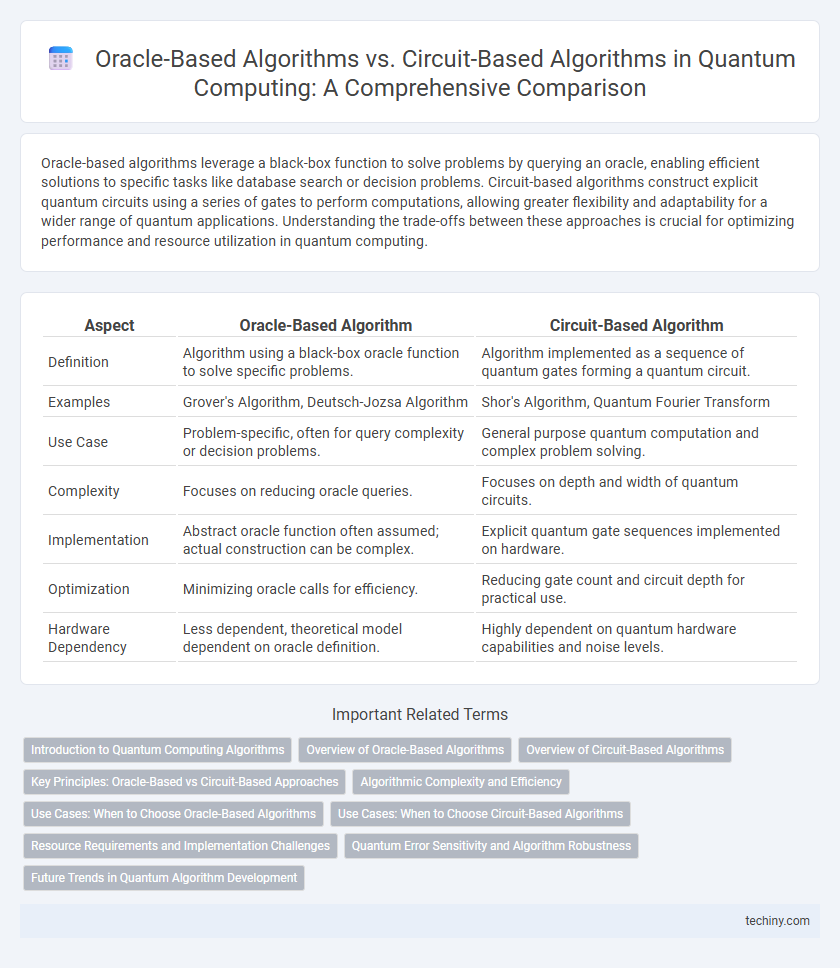Oracle-based algorithms leverage a black-box function to solve problems by querying an oracle, enabling efficient solutions to specific tasks like database search or decision problems. Circuit-based algorithms construct explicit quantum circuits using a series of gates to perform computations, allowing greater flexibility and adaptability for a wider range of quantum applications. Understanding the trade-offs between these approaches is crucial for optimizing performance and resource utilization in quantum computing.
Table of Comparison
| Aspect | Oracle-Based Algorithm | Circuit-Based Algorithm |
|---|---|---|
| Definition | Algorithm using a black-box oracle function to solve specific problems. | Algorithm implemented as a sequence of quantum gates forming a quantum circuit. |
| Examples | Grover's Algorithm, Deutsch-Jozsa Algorithm | Shor's Algorithm, Quantum Fourier Transform |
| Use Case | Problem-specific, often for query complexity or decision problems. | General purpose quantum computation and complex problem solving. |
| Complexity | Focuses on reducing oracle queries. | Focuses on depth and width of quantum circuits. |
| Implementation | Abstract oracle function often assumed; actual construction can be complex. | Explicit quantum gate sequences implemented on hardware. |
| Optimization | Minimizing oracle calls for efficiency. | Reducing gate count and circuit depth for practical use. |
| Hardware Dependency | Less dependent, theoretical model dependent on oracle definition. | Highly dependent on quantum hardware capabilities and noise levels. |
Introduction to Quantum Computing Algorithms
Oracle-based algorithms in quantum computing leverage a black-box function to solve specific problems more efficiently than classical methods, exemplified by Grover's search algorithm and Deutsch-Jozsa algorithm. Circuit-based algorithms implement quantum logic gates arranged in a sequence to perform complex computations, with Shor's algorithm being a prominent example for factoring large integers. Understanding the distinction between these quantum algorithm types is fundamental for advancing quantum algorithm design and optimizing quantum resource usage.
Overview of Oracle-Based Algorithms
Oracle-based algorithms leverage black-box functions, or oracles, to solve complex problems by querying these oracles efficiently, often achieving exponential speedups over classical counterparts. They play a critical role in quantum computing, enabling algorithms like Grover's search and Deutsch-Jozsa, which demonstrate superior performance in function evaluation and decision problems. These algorithms emphasize query complexity reduction and exploit quantum parallelism to extract global function properties with fewer evaluations than classical methods.
Overview of Circuit-Based Algorithms
Circuit-based algorithms in quantum computing utilize a sequence of quantum gates applied to qubits, enabling the execution of complex quantum operations through well-defined circuits. These algorithms offer high flexibility and universality, allowing implementation of a broad range of quantum tasks such as quantum Fourier transform, Grover's search, and Shor's factoring. The scalability of circuit-based algorithms is supported by advances in qubit coherence and gate fidelity, making them foundational for developing practical quantum computing applications.
Key Principles: Oracle-Based vs Circuit-Based Approaches
Oracle-based algorithms in quantum computing rely on black-box functions to encode problems, enabling efficient query-based solutions such as Grover's oracles for unstructured search. Circuit-based algorithms construct explicit quantum gate sequences to implement algorithms like Shor's, focusing on decomposing operations into universal gate sets for scalability and error correction. The key difference lies in oracles serving as problem-specific subroutines, while circuit-based approaches emphasize explicit gate-level quantum circuit design and optimization.
Algorithmic Complexity and Efficiency
Oracle-based algorithms leverage black-box functions to solve specific problems like database search with quadratic speedup, exemplified by Grover's algorithm, achieving O(N) query complexity. Circuit-based algorithms implement explicit quantum gates tailored for broader applications, often balancing gate depth and qubit usage to optimize overall runtime and error rates. In terms of algorithmic complexity, oracle-based methods excel in query efficiency but may incur overhead in oracle construction, while circuit-based algorithms offer adaptability at the cost of potentially higher resource demands.
Use Cases: When to Choose Oracle-Based Algorithms
Oracle-based algorithms excel in unstructured search problems, such as Grover's algorithm, where the goal is to find specific entries in large databases with quadratic speedup compared to classical methods. These algorithms are particularly suitable for decision problems and black-box function evaluations where the internal structure of the function is unknown or irrelevant. Circuit-based algorithms, by contrast, are more flexible for implementing complex quantum operations, but oracle-based approaches remain optimal for scenarios requiring efficient querying of unknown datasets.
Use Cases: When to Choose Circuit-Based Algorithms
Circuit-based algorithms excel in implementing complex quantum operations requiring precise control over qubit states for problems like quantum simulation, optimization, and error correction. These algorithms suit scenarios needing universal quantum computers capable of executing varied gate sequences, such as in quantum chemistry and material science modeling. They offer flexibility and scalability for tasks demanding intricate quantum gate manipulation beyond the scope of oracle-based approaches.
Resource Requirements and Implementation Challenges
Oracle-based algorithms in quantum computing typically require fewer qubits but demand highly specialized oracles that can be complex to construct and verify, posing significant implementation challenges. Circuit-based algorithms often involve larger, more generalized quantum circuits which increase qubit counts and gate depths, thereby escalating resource consumption and susceptibility to noise. Balancing qubit efficiency against oracle complexity is critical to optimizing both resource requirements and practical deployment in quantum systems.
Quantum Error Sensitivity and Algorithm Robustness
Oracle-based algorithms in quantum computing often exhibit higher quantum error sensitivity due to frequent oracle queries that amplify gate imperfections and decoherence effects. Circuit-based algorithms demonstrate greater robustness by leveraging structured gate sequences and error mitigation techniques that reduce cumulative noise impact. Optimizing error correction codes specific to oracle operations remains critical to improving the stability and reliability of these quantum algorithms.
Future Trends in Quantum Algorithm Development
Oracle-based algorithms, known for their capability in solving specific problems like unstructured search and function identification, are evolving with enhanced query efficiency and error resilience. Circuit-based algorithms demonstrate scalability and adaptability through optimized gate designs and noise reduction techniques, enabling complex computations across various quantum platforms. Future trends emphasize hybrid models that integrate oracle-based queries within circuit-based frameworks to achieve improved performance and broader application scope in quantum computing.
oracle-based algorithm vs circuit-based algorithm Infographic

 techiny.com
techiny.com